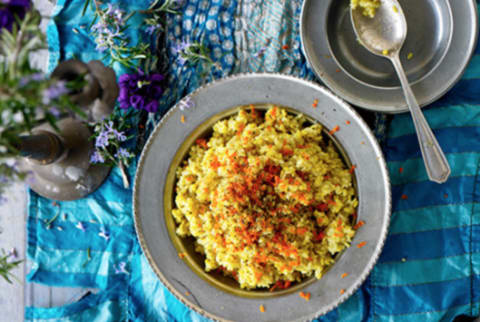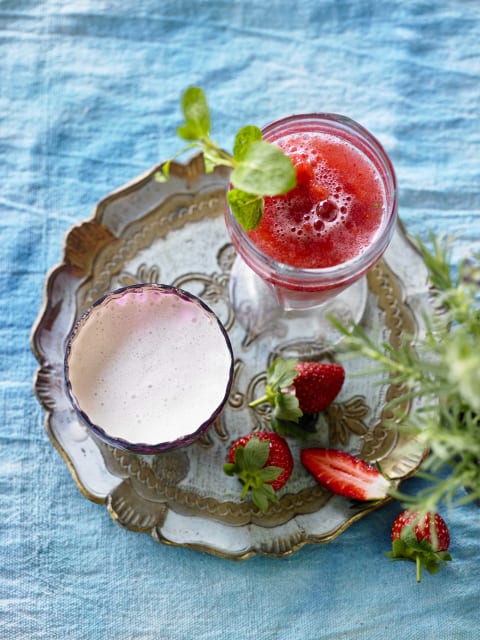Advertisement


Ayurveda is an ancient Indian medicine and lifestyle system that can enrich your life in unbelievable ways. Partaking in an Ayurvedic-type cleanse can not only help rest and heal your gut but also achieve the best results possible for your tummy, brain, and soul.
In Ayurveda, each person has specific energies that circulate around their body and govern both their physiological activity and appearance, called doshas. There are three main doshas: vata, pitta, and kapha.
The quiz below will help establish your dominant dosha. Keep in mind that it could be a mixture of two or even, less commonly, all three doshas! The more answers you have in each letter, the stronger you are in that dosha.
A quiz to find out your dosha
- What's your closest body type?
- Thin build
- Medium build
- Large build
- Which of these most accurately reflects your relationship with weight?
- Have trouble gaining weight
- Gain weight but can lose it quickly
- Easily gain weight and find it difficult to lose
- What's your face shape?
- Oval
- Triangular (pointed chin and prominent jawline)
- Round
- Which best describes your hair?
- Dry, thin, brittle, and knots easily
- Straight, prone to hair loss
- Thick, full, lustrous, wavy, and slightly oily
- Are your joints:
- Small, with prominent bones, often crack
- Medium and loose
- Large, sturdy, with lots of surrounding muscle
- Let's talk about appetite. Is yours:
- Irregular in frequency and size
- Strong—cannot skip a meal
- Steady, regular, and skips meals
- In terms of physical activity, which best describes you?
- Very active (always on the go, mind constantly thinking)
- Likes to think before doing anything
- Steady and graceful (no rush)
- Which of the following best matches your personality?
- Vivacious, talkative, social, and outgoing
- Likes to be in control, intense, and ambitious
- Reserved, laid-back, and concerned
- Most often, is your sleep:
- Short and broken
- Moderate and sound
- Deep and long
- Which of the following best describes your financial practices?
- Buys on impulse
- Spends money on luxuries
- Good at saving money
Now, tally up your results!
If you got mostly A's, you're a vata!
Vatas are creative and contagiously energetic. The elements associated with vata are air and ether, meaning just like wind, you can quickly get off balance.
To balance a vata, I recommend the following:
Start your day with slow breathing exercises to bring awareness into your body. Not only is this a calming way to begin a morning, it also prepares you for the day ahead. Gentle yoga is an amazing tool for a vata and should be undertaken regularly. Calming walks through nature can help bring you back into balance. Try to slow down and focus on breath rather than movement.
Your diet staples should consist of warm and cooked foods. Start the day with a nourishing breakfast bowl such as my Fig and Cardamom Breakfast Bowl, which you can make by blending together a cup of almond milk, four figs, one banana, and a tablespoon of almond butter until smooth and creamy. There's nothing more comforting for vatas than the fragrant sweetness of figs and the creaminess of almond butter. Figs are cooling and soothing for the delicate tissues of the digestive system.
This can be accompanied by warm water or a mug of herbal tea, which should be continuously sipped on throughout the day. A lovely tea for vatas is my turmeric, cardamom, and cumin tea. Simply combine 1⁄4 teaspoon ground turmeric, 1⁄4 teaspoon ground cardamom or the seeds from 2 pods, ground, and 1⁄4 teaspoon ground cumin in a mug. Pour over boiling water and let steep for at least one minute before drinking.
During the cleansing period, raw foods, should be minimized. As a vata, you thrive on grounding foods and good fats and oils, so think about adding more ghee and coconut oil into your diet when cooking vegetables. Focus on warming, sweet, salty, and sour foods to ground you and bring stability like my Slow-Cooked Balancing Vegetables (below). This serves six so enjoy it with friends or family or save portions and extend your Ayurvedic lifestyle over several days and see how you feel. If you have this for lunch, try the kitchari (see recipe below) for dinner, or vice versa.
Slow-Cooked, Balancing Vegetables for Vata

Ingredients
- 4 parsnips, peeled and diced
- 1 large onion, chopped
- 2 garlic cloves, crushed
- 2 carrots, diced
- 2 zucchini (courgettes), chopped
- 185 mL (6 fluid ounces or 3⁄4 cup) vegetable stock
- 400 g (14 ounces) tin additive-free diced tomatoes
- 2 tablespoons curry powder
- 2 teaspoons cumin seeds or ground cumin
- 2 tablespoons wheat-free tamari
- 1 teaspoon ground turmeric
- 1⁄2 teaspoon Celtic sea salt
- 500 g (1 pound, 2 ounces) frozen peas
Method
Combine all the ingredients except the peas in a slow cooker. Cover and cook on low for 8 to 9 hours. Add the peas 10 minutes before serving. If you don't have a slow cooker, bake this in an ovenproof dish in a 140°C (275°F) oven for 2 to 3 hours.
To achieve balance in body weight, vatas should try stick to eating and sleeping at the same time every day. A regular nap from 2 to 4 p.m. is recommended; however, if this is not possible, try to make a pattern of going to bed early.
If you got mostly B's, you're a pitta.
Pittas have a sharp mind and are very good problem solvers but tend to be controlling. The elements associated with pitta are fire, meaning they can be warm, oily, and intense. When a pitta is out of balance, they often feel anger and jealousy. To cool down a fiery pitta, cooling foods are your go-to. To balance a pitta, I recommend the following:
Start the day with cooling breathing exercises, focusing on keeping a relaxed and extended exhalation. These breathing exercises have a cooling quality to bring about feelings of compassion and kindness, which are a beautiful way to bring in the new day.
Pittas respond extremely well to sweet fruits and vegetables, including leafy greens and cucumbers, so there's no better way to start the day than with my Egg-White Omelet With Zucchini and Mushrooms (recipe below).

You could also try a Bircher Muesli Bowl or making a jug of my cooling strawberry slushie by using two large handfuls of ice cubes, two mint sprigs, one cup of strawberries, hulled, and four cups of sparkling mineral water or soda water. Whiz the ice cubes and mint leaves in a food processor or blender to a slushy consistency. With the motor still running, add the strawberries and blend to break up. Pour in half the mineral or soda water and pulse to combine. Pour into a large jug, add the remaining water, stir, and serve immediately. In Ayurveda, mint helps disperse fluids and heat, which creates a cooling effect on the body. The aroma of mint can inspire and refresh the brain and create a feeling of letting go.
Egg-White Omelet With Zucchini and Mushrooms for Pitta
Serves 1
Ingredients
- 45 g (11⁄2 ounces) mixed mushrooms, larger ones torn
- 1 small zucchini (courgette), grated
- 1 teaspoon ground cumin
- 1⁄2 teaspoon ground coriander
- 4 egg whites, lightly beaten
Method
Combine the mushrooms, zucchini and spices with a few drops of filtered water in a frying pan over medium heat and cook for 1 minute. Reduce the heat to low and add the egg whites. Cover and cook for 5 minutes, or until the egg is cooked.
During your cleanse, I recommend steering clear of excess salt, hot spices, sour fruits, and alcohol and instead, focus on cooling foods to keep you in balance. As a pitta, it's important to not miss meals as it can avoid and aggravate your system and mind.
To achieve balance, pittas should exercise regularly during the cooler part of the day. Engage in water activities like swimming, or if that's not your thing, immersing in nature walks is great too. Some fabulous yoga poses for pittas include standing forward bends and additionally, focusing on that abdominal area with yoga twists!
Cool water and calming herbal teas are your best friends! These all improve digestion and cool you down so are perfect at the end of the day. For dinner, enjoy some kitchari (see below).
If you got mostly C's, you're a kapha!
Kaphas are the most grounded of the doshas and are very nurturing but tend to fear change. The element associated with kapha is earth, linked to damp and slowness, so it can be a slow process to bring a kapha back into balance. To balance a kapha, I recommend the following:
To balance a kapha, we sometimes need to spice things up! That means changing up your routine. A nonsedentary way of life is what you need to create a new energetic flow! It's so important for a Kapha to stay active and exercise. I recommend practicing heart-opening yoga poses to stretch out the throat, relieve congestion, and drain the sinuses first thing in the morning.

Dairy tends to aggravate a kapha and cause mucus accumulation, so you will need to reduce your intake. Focus on airy and dry foods, like veggies, fruits, salads, legumes, and spicy foods. I recommend scrambled eggs spiked with turmeric and cumin, or, if you're up for it, you could go for a fast until dinnertime. Start the day with my Cup of Life Morning Broth. Go as long as you can just sipping the broth; however, if you feel tired or faint, break the fast with some kitchari (recipe below).
Include fasting into your routine two days a week and choose lighter meals that oppose sluggishness that kaphas are so prone to. Some foods I recommend on fast days include soups, vegetable juices, smoothies. My Cup of Life Morning Broth is perfect for a lighter option, and, by the way, you can have it at anytime of the day! All you need is 250 mL (9 fluid ounces/1 cup) vegetable stock (preferably homemade) plus 1 teaspoon Churna Masala for your dosha. For kapha this churna masala works well; you can make more in quantity and then use it at anytime during your cleanse:
Cup of Life Morning Broth for Kapha
Makes ½ cup
Ingredients
- 2 tablespoons coriander seeds
- 1 tablespoon cumin seeds
- 1 tablespoon fenugreek seeds
- 1 tablespoon ground ginger
- 1 tablespoon ground turmeric
- 1 tablespoon ground cinnamon
- 1 teaspoon ground cloves
- 1⁄4 teaspoon ground black pepper
- 1⁄4 teaspoon chili powder
- 1 cup vegetable stock
Method
- Gently toast the spices then grind with a mortar and pestle.
- Warm the stock in a saucepan over medium heat to a gentle simmer. Add the spices and stir to combine. Strain into a cup or bowl and enjoy mindfully.
Pungent spices like cayenne pepper, mustard seeds, and ginger should be used frequently and are your best friend. Ginger is a great spice that can stimulate digestion, so it's the perfect beverage to be enjoyed after a meal.
Using just a few of these beautiful Ayurvedic tools can seriously improve your overall well-being. If you want to keep the cleanse going longer, just repeat these recipes for several days, or get even more options in my cookbook.
A great recipe for all dosha types during an Ayurvedic cleanse is kitchari. This is a nourishing, soothing, and very easy-to-digest cleansing meal. You can prepare a big batch and have it on hand to enjoy during your cleanse. Simply warm one cup of the cooked mixture with one half cup of water and add chopped vegetables to suit your dosha. Some people like to do kitchari-only cleanses; if you do, it's good to ensure you are drinking enough water if you are doing a kitchari cleanse.
Kitchari: A healing recipe for all doshas
Note: Pittas should omit the salt or use minimal and only use basmati rice; kaphas should halve the quantity of the ghee.
Serves 4
Ingredients
- 200 g (7 oz/1 cup) brown basmati or brown rice, soaked for 3 hours in filtered water and 2 tablespoons apple cider vinegar, then drained
- 225 g (8 oz/1 cup) mung beans (moong dal), soaked for 3 hours in filtered water and 2 tablespoons apple cider vinegar, then drained
- 2.5-cm (1-inch) piece of ginger, grated 2.5-cm (1-inch) piece of turmeric, grated, plus extra, grated, to serve (optional), or 2 teaspoons ground turmeric
- 2 teaspoons ground cumin
- pinch of asafetida
- 1 tablespoon ghee
- 1 litre (35 fl oz/4 cups) filtered water Celtic sea salt and freshly cracked black pepper, to taste
Method
- Combine all the ingredients except the salt and pepper in a large saucepan over medium heat and bring to a boil. Reduce heat to low, then cover and simmer for 20 to 30 minutes or until all the water is absorbed.
- Season with salt and pepper, sprinkle over extra grated turmeric (if using), and serve.
Watch Next
Enjoy some of our favorite clips from classes
Enjoy some of our favorite clips from classes
What Is Meditation?
Mindfulness/Spirituality | Light Watkins
Box Breathing
Mindfulness/Spirituality | Gwen Dittmar
What Breathwork Can Address
Mindfulness/Spirituality | Gwen Dittmar
The 8 Limbs of Yoga - What is Asana?
Yoga | Caley Alyssa
Two Standing Postures to Open Up Tight Hips
Yoga | Caley Alyssa
How Plants Can Optimize Athletic Performance
Nutrition | Rich Roll
What to Eat Before a Workout
Nutrition | Rich Roll
How Ayurveda Helps Us Navigate Modern Life
Nutrition | Sahara Rose
Messages About Love & Relationships
Love & Relationships | Esther Perel
Love Languages
Love & Relationships | Esther Perel

















